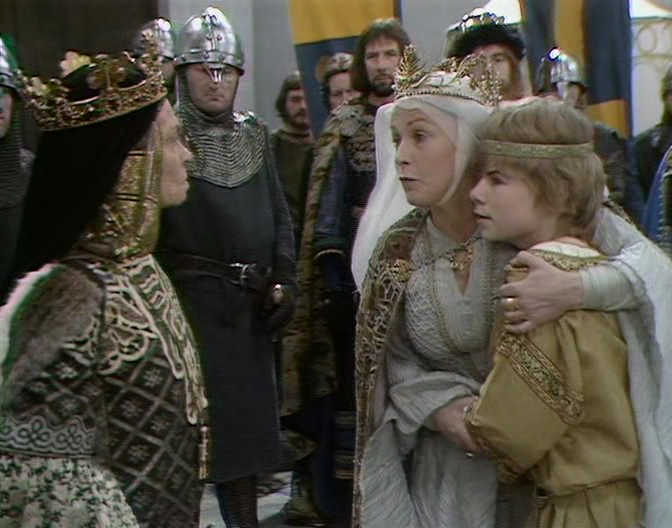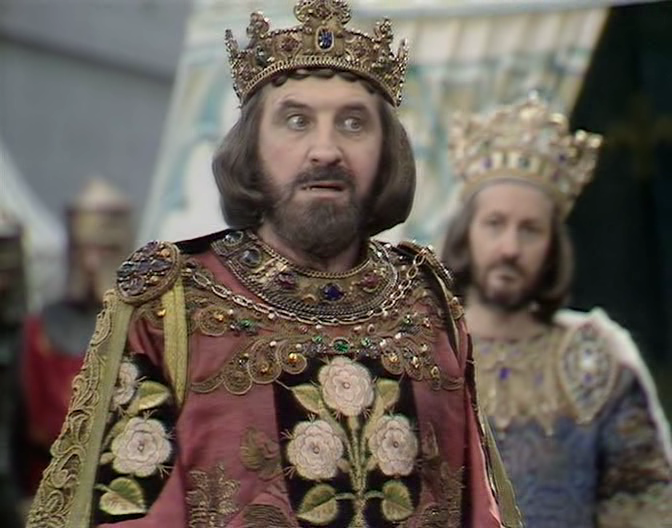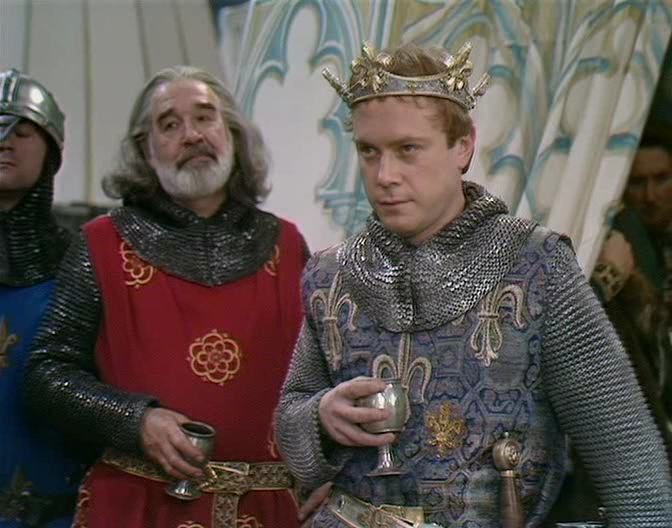

Making its debut with Romeo and Juliet on 3 December 1978, and concluding nearly seven years later with Titus Andronicus on 27 April 1985, the BBC Television Shakespeare project was the single most ambitious attempt at bringing the Bard of Avon to the small screen, both at the time and to date.
Producer Cedric Messina was already an experienced producer of one-off television Shakespeare presentations, and was thus ideally qualified to present the BBC with a daunting but nonetheless enticingly simple proposition: a series of adaptations, staged specifically for television, of all 36 First Folio plays, plus Pericles (The Two Noble Kinsmen was considered primarily John Fletcher's work, and the legitimacy of Edward III was still being debated).
The scale of Messina's proposal, far greater than that of previous multi-part Shakespeare series such as An Age of Kings (BBC, 1960) and Spread of the Eagle (BBC, 1963), required an American partner in order to guarantee access to the US market, deemed essential for the series to recoup its costs. Time-Life Television agreed to participate, but under certain controversial conditions - that the productions be traditional interpretations of the plays in appropriately Shakespearean period costumes and sets, designed to fit a two-and-a-half-hour time slot.
The running-time requirement was swiftly jettisoned when it became clear that the major tragedies in particular would have suffered severely, but other artistic restrictions remained largely in place throughout. Although later productions under Messina's successors Jonathan Miller and Shaun Sutton would be more experimental, Miller was unable to persuade first-choice directors such as Peter Brook and Ingmar Bergman to take part, and Michael Bogdanov resigned from Timon of Athens (eventually tx, 4/16/1981, with Miller himself directing) after his modern-dress interpretation was considered too radical a departure.
This gave the BBC Television Shakespeare cycle the reputation of being overly staid and conventional, which was not always deserved. Though Messina's own productions (1978-80) were largely conservative, Jonathan Miller (1980-82) revamped things both visually (thanks to a design policy of sourcing sets and costumes from great paintings of the era in which the play was set) and in terms of direction and casting, in some cases using popular actors with little or no Shakespeare experience (John Cleese as Petruchio, Bob Hoskins as Iago) to attract new and younger audiences.
Under Miller, directors such as Jack Gold, Jane Howell and Elijah Moshinsky were encouraged to be more adventurous, with Howell in particular adopting such a stylised approach for The Winter's Tale (tx. 8/2/1981) and the Henry VI/Richard III cycle (tx. 2-23/1/1983) that they pushed the definition of "traditional" to the limit, but also garnered the series some of its best reviews. Miller's aesthetic policies continued under Shaun Sutton (1982-85), who brought the project to a belated close.
Whatever its artistic reputation, there was no doubt that the BBC Television Shakespeare was a commercial triumph, breaking even financially by 1982 (ahead of expectations) and fully justifying Messina's gamble. Its success was helped by the rapid growth of video recorders in schools, creating a secondary market that was much bigger than initially predicted - though the initial decision to sell the plays only as a complete set provoked complaints from people who baulked at paying the substantial asking price because they were after a smaller selection or individual titles. The BBC eventually released some of the more popular titles separately, but it was not until late in 2005 that the entire series was available individually on DVD at a competitive price.
Although the BBC Television Shakespeare project as a whole met with a mixed reception, it had several positive virtues. Chief among them was the fact that its completist remit meant that several of the more obscure plays received their first television adaptation, and in most cases the BBC version remains the only one. Happily, such productions as Henry VIII (tx. 25/2/1979), Cymbeline (tx. 10/7/1983), Pericles (tx. 11/6/1984) and Titus Andronicus were considered amongst the cycle's most impressive achievements, with Henry VIII subsequently voted the best production of all by the Shakespeare Association of America.
A complete list of BBC Television Shakespeare productions is as follows:
Series One (producer: Cedric Messina): Romeo and Juliet (tx. 3/12/1978), Richard II (tx. 10/12/1978), As You Like It (tx. 17/12/1978), Julius Caesar (tx. 11/2/1979), Measure For Measure (tx. 18/2/1979), Henry VIII (tx. 25/2/1979)
Series Two (p. Cedric Messina): Henry IV Part One (tx. 9/12/1979), Henry IV Part Two (tx. 16/12/1979), Henry V (tx.23/12/1979), Twelfth Night (tx. 6/1/1980), The Tempest (tx. 27/2/1980), Hamlet (tx. 25/5/1980).
Series Three (p. Jonathan Miller): The Taming of the Shrew (tx. 23/10/1980), The Merchant of Venice (tx. 17/12/1980), All's Well That Ends Well (tx. 4/1/1981), The Winter's Tale (tx. 8/2/1981), Timon of Athens (tx. 16/4/1981), Antony and Cleopatra (tx. 8/5/1981)
Series Four (p. Jonathan Miller): Othello (tx. 4/10/1981), Troilus and Cressida (tx. 7/10/1981), A Midsummer Night's Dream (tx. 13/12/1981)
Series Five (p. Jonathan Miller, Shaun Sutton): King Lear (tx. 19/9/1982), The Merry Wives of Windsor (tx. 28/12/1982), Henry VI Part One (tx. 2/1/1983), Henry VI Part Two (tx. 9/1/1983), Henry VI Part Three (tx. 16/1/1983), Richard III (tx. 23/1/1983), Cymbeline (tx. 10/7/1983)
Series Six (p. Shaun Sutton): Macbeth (tx. 17/10/1983), The Comedy of Errors (tx. 24/12/1983), The Two Gentlemen of Verona (tx. 27/12/1983), Coriolanus (tx. 21/4/1984), Pericles (tx. 11/6/1984)
Series Seven (p. Shaun Sutton): King John (tx. 24/11/1984), Much Ado About Nothing (tx. 30/11/1984), Love's Labour's Lost (tx. 5/1/1985), Titus Andronicus (tx. 27/4/1985)
The BBC also produced Shakespeare in Perspective, an accompanying series of 25-minute personal introductions to individual plays by an eclectic range of presenters from the literary (Anthony Burgess, Dennis Potter, Jilly Cooper) to the scholarly (Germaine Greer, Frank Kermode, Michael Wood) to the celebrity (Roy Hudd, George Melly, Barry Took). These usually took the form of straight-to-camera addresses from assorted locations with some connection to the play, which were intercut with extracts from the accompanying BBC Shakespeare production, usually screened later that evening.
Michael Brooke
For the BBC Television Shakespeare, tx. 24/11/1984, colour, 157 mins
Director David Giles
Production Companies BBC Television, Time-Life Television
Producer Shaun Sutton
Script Editor David Snodin
Designer Chris Pemsel
Music Colin Sell
Cast: Leonard Rossiter (King John), William Whymper (Chatillon), Mary Morris (Queen Elinor), Robert Brown (Earl of Pembroke), John Castle (Earl of Salisbury), John Flint (Lord Bigot), John Thaw (Hubert de Burgh), George Costigan (Philip, the Bastard)
The life and death of England's 'bad king', in conflict not only with the French and the Pope but also those who dispute his claim to the throne.

Produced near the end of the mammoth BBC Television Shakespeare project, The Life and Death of King John (tx. 21/11/1984) also featured the last recorded performance by Leonard Rossiter, who died between production and transmission.
David Giles had previously helmed the BBC Shakespeare's Richard II/Henry IV/Henry V cycle (1978-79), though he adopts a more stylised approach here - especially in France, represented by a patently fake blue-sky backdrop studded with white fleurs-de-lys. The decision to present the text almost intact (see below) and limit onscreen action to Shakespeare's original specifications results in some lengthy, somewhat static speeches, and many key narrative elements are treated purely as verbal accounts by messengers, without even the silent visual flashbacks characteristic of other screen Shakespeares.

As a result, this production relies heavily on the calibre of its cast, but is thankfully well served. Rossiter gives a dark and saturnine reading of English history's 'bad king', the wig, crown and close-cropped beard ensuring that there's little potentially distracting physical resemblance to the sitcom roles that made him famous. His wheedling voice and fake bravado are much more familiar - though entirely fitting a man manifestly unfit to be king, both in terms of legitimacy and personal merit.
George Costigan is effectively contrasted as the charming but scheming Philip the Bastard, delivering his more conspiratorial soliloquies as if conferring privately with the audience in order to win them over. Mary Morris and especially Claire Bloom give powerful voice to Elinor and Constance, respective mothers to John and the doomed but arguably more legitimate Arthur, while John Thaw fleshes out the loyal but sentimental Hubert de Burgh, disobeying the King's orders to have Arthur killed, then strategically confessing after John's typically opportunistic change of mind.

Scholars disagree as to the play's precise date, but it is generally thought to precede Richard II, and it suffers from the comparison. Both plays depict deeply flawed monarchs who end up usurped and murdered, but John's invective lacks the poetic intensity of Richard's private soliloquies, and consequently the latter's tragic stature. But this production is nonetheless a valuable record of a rarely-staged minor play, and a welcome reminder of Rossiter's versatility as a serious actor.
(The cuts are so minimal that they can be itemised here: act/scene/line references from the Arden Shakespeare edition edited by E.A.J.Honigmann are 2.1.486; 3.1.196-201 and 219-220; 3.3.32 and 96; 4.1.16-24, 41-58, 60-67 and 117-120; 4.2.233; 4.3.47)
Michael Brooke
http://rapidshare.com/files/115686747/The_Life_and_Death_of_King_John_BBC.part01.rar
http://rapidshare.com/files/115687147/The_Life_and_Death_of_King_John_BBC.part02.rar
http://rapidshare.com/files/115687535/The_Life_and_Death_of_King_John_BBC.part03.rar
http://rapidshare.com/files/115687923/The_Life_and_Death_of_King_John_BBC.part04.rar
http://rapidshare.com/files/115688274/The_Life_and_Death_of_King_John_BBC.part05.rar
http://rapidshare.com/files/115688607/The_Life_and_Death_of_King_John_BBC.part06.rar
http://rapidshare.com/files/115689011/The_Life_and_Death_of_King_John_BBC.part07.rar
http://rapidshare.com/files/115689406/The_Life_and_Death_of_King_John_BBC.part08.rar
http://rapidshare.com/files/115689755/The_Life_and_Death_of_King_John_BBC.part09.rar
http://rapidshare.com/files/115690088/The_Life_and_Death_of_King_John_BBC.part10.rar
http://rapidshare.com/files/115690440/The_Life_and_Death_of_King_John_BBC.part11.rar
http://rapidshare.com/files/115690848/The_Life_and_Death_of_King_John_BBC.part12.rar
http://rapidshare.com/files/115690917/The_Life_and_Death_of_King_John_BBC.part13.rar
no pass



0 comments:
Post a Comment